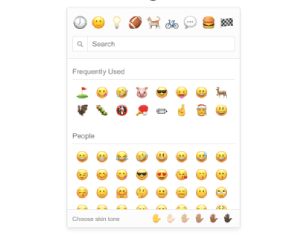Web Component: j-Emoji
j-Emoji
- Using UTF emoji
- Personal history with frequently used emoticons
- Great search tool
- Changeable skin tones
Configuration:
categories{String}change emoticons in categories. Use unicode without special characters (default:128342,128578,128161,127944,128008,128690,128172,127828,127937)height{Number}set component height (default:295)history{Number}history limit for frequently used emoticons (default:49)empty{String}a message when no emoticons are found (default:No emoji match your search)emptyemoji{Number}change emoticon when no emoticons are found. Use unicode without special characters (default:128557)speed{Number}scroll speed in ms (default:500)footer{String}footer message (default:Choose skin tone)toneemoji{String}skin tones emoticon. Use unicode without special characters (default:9995)search{String}a placeholder for search field (default:Search)
Good to know:
- This component implements
FUNC.parseASCI(string)function. The function will parse string and transform text like:Dor:joy:into UTF emoticons.
var message = 'This one was good. :joy: See you soon :P';
console.log(FUNC.parseASCI(message)); // This one was good. 😂 See you soon 😛Usage
var opt = {};
// opt.offsetX {Number} : adds X offset (default: 0)
// opt.offsetY {Number} : adds Y offset (default: 0)
// opt.align {String} : align `left` (default), `center` or `right`
// opt.position {String} : position `top` (default) or `bottom`
opt.element = YOUR_ELEMENT;
// or if you want to use a fixed position:
// opt.x {Number} : `x` position
// opt.y {Number} : `y` position
opt.callback = function(emoji) {
console.log(emoji); // callback parameter has String.fromCodePoint() value
};
SETTER('emoji/show', opt);Author
- Denis Granec info@totalavengers.com
- License
Created
18. march 2019
Updated
05. august 2025
jComponent library
19
Version
v1
License
https://www.totaljs.com/license/
Dark mode
Yes
Responsive
Yes
Author
Denis Granec
Email
info@totalavengers.com

